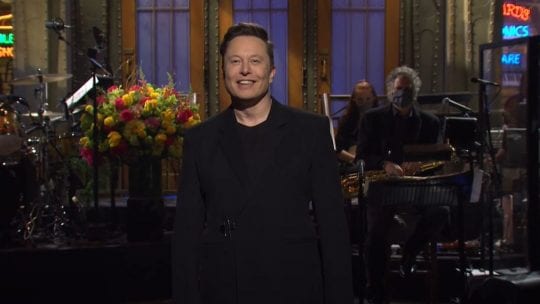
Social media has been abuzz (atwitter?) for weeks since “Saturday Night Live” announced tech billionaire Elon Musk’s May 8 hosting gig. So, how did the Tesla and SpaceX exec do, from a PR perspective?
The New York Times and Vulture described Musk’s approach as somewhere between promotion and parody. Perhaps David Leonhardt of the Times summarized it best as “a bit self-deprecating and a bit self-aggrandizing.” The Associated Press gave a more glowing review, describing “humility and hubris” in the headline.
A rare personal revelation
Many picked up on Musk’s mention of his Asperger’s diagnosis in the opening monologue. Although Musk incorrectly claimed to be the first SNL host with Asperger’s Syndrome, a behavioral disorder that falls on the “high-functioning” spectrum of autism.
Former SNL cast member and occasional host Dan Aykroyd has discussed the disorder openly. Still, Musk's disclosure lent an unexpected moment of vulnerability to his SNL debut.
Amends for Twitter comments?
That moment of personal candor clashes somewhat with Musk’s bombastic personality on Twitter, which has gotten him into trouble with the public and the SEC. In the last year, Musk has not deviated from a habit of stoking outrage, glibly tweeting “the coronavirus panic is dumb” in early March 2020, as a terrified public watched COVID-19 spread across the globe.
Still, Musk deserves at least some PR credit for meeting critics head-on.
“To anyone I’ve offended…I reinvented electric cars and I’m sending people to Mars on a rocket ship.” After some light laughter and applause, Musk waited to deliver the punch line: “Did you think I was also gonna be a chill, normal dude?”
The joke landed, in part, because Musk reacted in tandem with the audience, rolling his eyes in an extended moment of self-deprecation.
Terminology backlash
TikToker @cybergender was not as impressed with Musk’s disclosure as the live studio audience. The user, who has racked up 29,000 likes on their post, critiqued Musk’s shorthand use of “Asperger’s”—which they typed as “Asp*rg*rs,” calling it a “very harmful and outdated term.”
In addition, they claim Musk’s comment represents a wider trend of white, privileged men using autism diagnoses to excuse unacceptable behavior. They took issue with Musk’s preface–“Look, I know I sometimes say or post strange things, but that’s just how my brain works,”—calling it an evasive maneuver to avoid accountability.
They also pointed out Musk's brain implant venture Neuralink purports to one day treat neurological disorders.
(Many commenters came to Musk's defense.)
@cybergenderno surprise he’s promoted his neuralink to “solve” autism 🙄🙄♬ Fallin' in a Garden - LLusion
For PR pros concerned with the most up-to-date verbiage, the AP Style Guide lists it as “Asperger’s syndrome,” although it notes the phrasing is “part of a broader term called ‘autism spectrum disorder.’”
Similarly, the Autism Society website refers to the disease as “Asperger’s syndrome” and notes, “In 2013, the DSM-5 replaced Autistic Disorder, Asperger’s Disorder and other pervasive developmental disorders with the umbrella diagnosis of autism spectrum disorder.” In addition, the website uses “Asperger’s” as shorthand following its description, in spite of the TikToker taking issue with the term as offensive.
Playing the villain
Public sympathy arising from the disclosure may be short-lived. It’s not as though much of the public—or “SNL”—has spared Facebook's Mark Zuckerberg from ethical critique, despite that some consider Zuck on the spectrum.
As a world-famous billionaire inventor known for lacking empathy in his public statements, Musk spent much of the evening edging away from (and parodying) his super-villain status. In a cringey courtroom sketch featuring Musk as Super Mario villain Wario, and his real-life partner Grimes as damsel-in-distress Princess Peach, another public figure facing cascading PR crises defended Wario (Musk): Andrew Cuomo (Pete Davidson), arguing anti-Wario sentiment is anti-Italian American.
(Not much of a) PR ROI
Given the mixed reviews, financial markets might better illustrate the results of Musk’s SNL appearance than social media takes. Dogecoin, the cryptocurrency Musk embraces, lost a third of its value Sunday. This was partially an apparent response to a “Weekend Update” segment poking fun at the tech exec’s evasion of a proper explanation of Dogecoin’s relevance. In the sketch, Musk chuckled “Yeah, [Dogecoin] it's a hustle,” as cast member Michael Che peppered him with questions, which he jokingly evaded.
Still, Dogecoin prices are soaring at more than 10,000 percent, and SpaceX plans to fund a future Moon mission with the currency, according to Musk.
Moreover, Tesla stocks were down early today (May 10). That's not all about Musk’s SNL appearance. Tesla is in the thicket of a National Highway Traffic Safety Administration investigation into recent crashes of Tesla vehicles (including a high-profile case less than a month ago).
If he cares about share prices, perhaps Musk soon will consider hiring a PR firm to conduct sentiment analysis–considering he's already fired his in-house team.
Sophie Maerowitz is senior content manager for PRNEWS. Follow her @SophieMaerowitz.
